


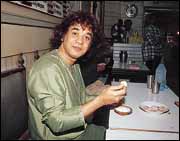 'Wah Huzoor! Khane Ka Jawab Nahin!
'Wah Huzoor! Khane Ka Jawab Nahin!Over Nalli Nihari and Karari Roti at Noor Mohammedi Hotel in Bombay, USTAD ZAKIR HUSSAIN tells MARK MANUEL that next to music... his big passion is food. |
|
THE muezzin had finished calling the azaan from the minarets of a mosque outside Noor Mohammadi Hotel in Bhendi Bazar, Bombay's Muslim quarter, and the faithful were settling down to dinner after the evening namaz. Ustad Zakir Hussain and I were doing the same. Only, we hadn't come in from the mosque. We came from work. I from my office. He from Famous Studios. He was scoring music for an Indian film that was being rushed to Cannes. Dinner was his break. His plan that day had been to watch Tendulkar bat in the Test against Australia. Instead, he got called to the studio! Now, showered, shaved and in a fresh, sea green kurta-pyjama, he played the tabla on the armrest of my car as I drove him to dinner. "This restaurant, what's it like," he asked in anticipation. "You'll love it," I told him, "it's Ismail Merchant's favourite eating place in Bombay."
He loves to eat, but has to struggle to keep his weight down. "I keep ping-ponging between 146 and 150 pounds," he told me regretfully. "I should be at least 8, 9 pounds lighter." I made a quick calculation. The Ustad was 68 kg. "I eat everything under the sky... but now I've learned to watch quantity. A spoon or two at the most. And I do yoga, some walking, no rigorous exercise for me, but it still takes a pound or two off." Twisting around in his seat, he read the Urdu menu out loud: "Kheema, Shammi Kebab, Dal Gosht, Nalli Nihari, Bheja, Shahi Plate, Mutton Chaap... very nice!" All around us, diners were slurping and burping. Zakir Hussain ignored the distraction. Just like he did the garish interiors. And when a stray cat siddled upto him, miaowing for a handout, the Ustad looked like he wanted to slip it something beneath the table. This is the gourmet who wines and dines in all the Michelin-rated restaurants of the world. And who knows most international master chefs by first name. He discussed our dinner with Mr. Mohammed Khalid, the restaurateur.
"Hmmn, now let's see, we'll have the Nalli Nihari certainly, though this is a breakfast dish, nashte ka khanna, and we'll have the Chicken Achari, it should be good. Shammi Kebabs are very North Indian, we make them at home too, thin... like pate. I'd like to try the Dal-Ghee, that's
unusual! Chicken Korma? If you say so. And what's for dessert? Phirni! That's interesting.
In between dinner, he talked about his passion for food. His favourite cuisine was Italian. It was common in Europe. And his wife was an American of Italian descent. Her family made some unsual food that you would not find in any restaurant. Their home was in California, and California was the home of nouvelle cuisine. A state of unusual tastes. It was chic to eat unusual cuisines in the US. Sushi with Californian rolls, a chicken curry salad, things like that. He talked about musician friends, because of them, he had tasted a home-cooked meal of every cuisine in most countries of the world. Now he called for roti. "Beta, ek karari roti lana..." To me, "This is kadak roti, little things like this make a world of difference." He was at the same time giving me a review of the food. "Wah! This Nalli Nihari is excellent. First you taste the sauce, then the meat, they do take pains in making them taste
different. But the Shammi Kebab has not done the trick! I�m not excited by it. I'll go for the Chicken Korma."
And he talked about the unsual foods he had eaten. Raw fish, sushi and sashimi was no problem, he ate it all the time. Also oysters. But with Ismail Merchant and the Sony people in Japan, he once had snail that was skewered on a toothpick, dipped in soya and served - alive and squirming! He had eaten eel, raw and in hot garlic, reindeer, rabbit, Scandinavian bear, python with rock salt and alcohol ("it's flubby, like whale"), ostrich, lama, and wild boar marinated in mustard, maple syrup and tamari, which is a saya sauce. "Basically, my taste buds can tolerate anything," Zakir Hussain said.
He gave me footnotes on the rest of our dinner. "The Chicken Korma's something, you can taste the flavour of black elaichi in it, the big elaichi. The Chicken Achari's amazing." The waiter who brought the Yakhni Pulao, the Ustad sent back with instructions: "Salan dal ke lao, kamal hai!" And later, "What's good about the Pulao is that it's not paste, the grains are individual. It gives the dish substance. It's also got a cardamom feel. This is Kashmiri food.
|

Home Page
About the mag
Subscribe
Advertise
Contact Us
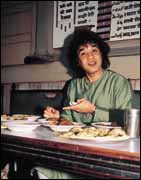 Now I watched him eat, sleeves rolled up, tablachi fingers delicately wrapping a crisp piece of roti around gravied chicken and popping it into his mouth. He was completely at home. But then he was home. Zakir Hussain is a Bombay boy with Kashmiri blood in him. He was born and brought up here. "On Indian food, a combination of Kashmiri wazwan, like Gushtaba, Kamargah, Rogan Josh and Qahwa, plus North Punjabi Bhindi Gosht and Stuffed Karela, and Gujarati Dal-Dokhli, Kadi, Undhiyu, and things like that," he explained. Foreign influences, exposure to the melting pot of world cuisines that aroused the gourmet in him, came early in his life. "Ever since I began travelling," he said, "I've been eating all sorts of food." He's been travelling and playing the tabla since he was 12, at an average of 15 to 18 days a month, and the Ustad is now 50, so how many times does that make it he has been around the world? He paused in between a mouthful to reply, "Enough to become a food maniac!"
Now I watched him eat, sleeves rolled up, tablachi fingers delicately wrapping a crisp piece of roti around gravied chicken and popping it into his mouth. He was completely at home. But then he was home. Zakir Hussain is a Bombay boy with Kashmiri blood in him. He was born and brought up here. "On Indian food, a combination of Kashmiri wazwan, like Gushtaba, Kamargah, Rogan Josh and Qahwa, plus North Punjabi Bhindi Gosht and Stuffed Karela, and Gujarati Dal-Dokhli, Kadi, Undhiyu, and things like that," he explained. Foreign influences, exposure to the melting pot of world cuisines that aroused the gourmet in him, came early in his life. "Ever since I began travelling," he said, "I've been eating all sorts of food." He's been travelling and playing the tabla since he was 12, at an average of 15 to 18 days a month, and the Ustad is now 50, so how many times does that make it he has been around the world? He paused in between a mouthful to reply, "Enough to become a food maniac!"
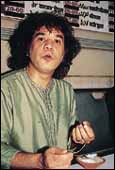 We weren't eating everything under the sky. Not even everything on the menu at Noor Mohammadi. Typically of Bhendi Bazar and its inexpensive eating houses, the menu was written on the wall, in Hindi and Urdu. The most expensive dish, I noted, was priced at Rs. 30. And the cheapest, the Shammi Kebab, at Rs. 3.50. This was that kind of joint. But the food, authentic Mughlai Uttar Pradesh cuisine, was almost to die for. Zakir Hussain, who knows all about street food in Bombay from Khau Galli to the Mahim dargah, could not wait to taste the house specialities.
We weren't eating everything under the sky. Not even everything on the menu at Noor Mohammadi. Typically of Bhendi Bazar and its inexpensive eating houses, the menu was written on the wall, in Hindi and Urdu. The most expensive dish, I noted, was priced at Rs. 30. And the cheapest, the Shammi Kebab, at Rs. 3.50. This was that kind of joint. But the food, authentic Mughlai Uttar Pradesh cuisine, was almost to die for. Zakir Hussain, who knows all about street food in Bombay from Khau Galli to the Mahim dargah, could not wait to taste the house specialities.
 What about some rice? What, a Yakhni Pulao? You're kidding! That's Kashmiri. Yes, yes, pulao leke aao!"
What about some rice? What, a Yakhni Pulao? You're kidding! That's Kashmiri. Yes, yes, pulao leke aao!"
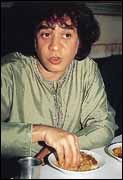 And he could cook most anything too. When he stayed in Bombay, his mother would not let him get into the kitchen. But at home in California, he was always experimenting. "If anything goes wrong, I send out for Chinese!" Cooking fascinated him. "I can make you a Karela Gosht so that you won't know it's karela," he said. "It'll taste sweet! The trick is with the onions. And I can do a Bhindi Gosht that is very, very nice. Or given the proper pressure cooker, a paya masala."
I said, "If you eat wild boar, you must not be a staunch Muslim. Do you drink too?" The Ustad ignored the first part of my question. "Drink," he said, "drinking's not for me. But I do have the occasional glass of wine. I'm no connoisseur, but I can tell whether a wine is good or bad. When you travel, you listen and hear and learn. And the airlines offer a wine menu with explanations. I play it safe by asking for a Merlot. I'm not a bubby person, either. I'll drink champagne only if it's a celebration. And no cigars, too. I've smoked joints at 21! Everybody did. That was a part of growing up." He also liked tea. I was reminded of the Taj tea ads. Ustad Zakir Hussain playing the tabla, sipping tea, and saying, "Wah, Taj!" At home, he only drinks Taj tea. "I'm faithful to the brand," he said loyally. He made the first campaign 12 years ago. "I guess it caught on. Taj Tea goes with me. I'm now a regular face. I do two ads. for them a year... that makes it 20, 22 I've done so far."
And he could cook most anything too. When he stayed in Bombay, his mother would not let him get into the kitchen. But at home in California, he was always experimenting. "If anything goes wrong, I send out for Chinese!" Cooking fascinated him. "I can make you a Karela Gosht so that you won't know it's karela," he said. "It'll taste sweet! The trick is with the onions. And I can do a Bhindi Gosht that is very, very nice. Or given the proper pressure cooker, a paya masala."
I said, "If you eat wild boar, you must not be a staunch Muslim. Do you drink too?" The Ustad ignored the first part of my question. "Drink," he said, "drinking's not for me. But I do have the occasional glass of wine. I'm no connoisseur, but I can tell whether a wine is good or bad. When you travel, you listen and hear and learn. And the airlines offer a wine menu with explanations. I play it safe by asking for a Merlot. I'm not a bubby person, either. I'll drink champagne only if it's a celebration. And no cigars, too. I've smoked joints at 21! Everybody did. That was a part of growing up." He also liked tea. I was reminded of the Taj tea ads. Ustad Zakir Hussain playing the tabla, sipping tea, and saying, "Wah, Taj!" At home, he only drinks Taj tea. "I'm faithful to the brand," he said loyally. He made the first campaign 12 years ago. "I guess it caught on. Taj Tea goes with me. I'm now a regular face. I do two ads. for them a year... that makes it 20, 22 I've done so far."
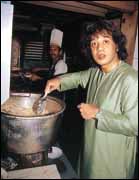 Biryanis are cooked with masala. Here, I imagine, the meat is steamed separately and then added to the rice." The little mud pot of Phirni, he passed before his nose appreciatively like a fine cognac. Then he tasted it. "It's grand! Not overly sweet, rich... but just right, and with the smell of the mithi of the pot. Excellent! Wah!" Mr. Mohammed Khalid was back with paan. Ustad Zakir Hussain looked at him sternly. "Kiya karta hai, huzoor! Itne acche khane ke baad paan? Chalo, jera saunf dena!"
Biryanis are cooked with masala. Here, I imagine, the meat is steamed separately and then added to the rice." The little mud pot of Phirni, he passed before his nose appreciatively like a fine cognac. Then he tasted it. "It's grand! Not overly sweet, rich... but just right, and with the smell of the mithi of the pot. Excellent! Wah!" Mr. Mohammed Khalid was back with paan. Ustad Zakir Hussain looked at him sternly. "Kiya karta hai, huzoor! Itne acche khane ke baad paan? Chalo, jera saunf dena!"